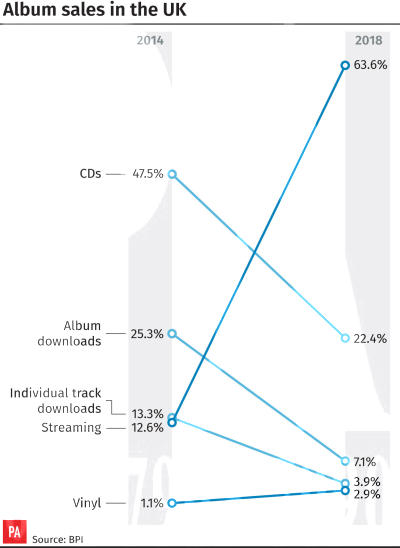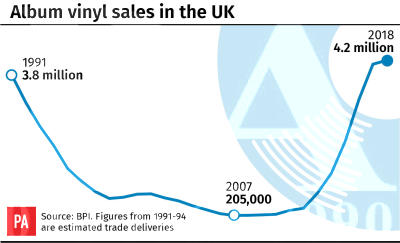Dua Lipa was the biggest-selling female artist of 2018, but was the only woman to be featured in the UK’s top 10 artist albums of the year.
According to end-of-year figures released by record labels’ association the British Phonographic Industry (BPI), Lipa’s self-titled debut album was the ninth top-selling record of 2018 (not including compilation albums) despite being released in June 2017.
Lipa also had the second most-streamed song of the year, One Kiss, with Calvin Harris, as well as the ninth most-streamed song, IDGAF.
BPI’s data shows that George Ezra’s Staying At Tamara’s was the most successful album to be released in 2018 overall.

It came in second place on the best-sellers list behind the official soundtrack to The Greatest Showman, which was released in December 2017.
Ezra, whose album was released in March 2018, outsold Ed Sheeran’s Divide, which was released in March 2017 but was the third most popular record of 2018.
Ezra’s single Shotgun was the third most-streamed of the past 12 months.
The BPI said the majority of the 20 biggest-selling artist albums of the year were by male artists, with the likes of Drake, Post Malone, Michael Buble and Eminem among the most successful.
Including Lipa, only four of the top 20 albums were released by women, with Jess Glynne’s Always In Between at number 14, Ariana Grande’s Sweetener at 16 and Paloma Faith’s The Architect at 17.

The film soundtracks for Mamma Mia! Here We Go Again, A Star Is Born and Bohemian Rhapsody were also in the top 20 on the artist albums chart, as well as Gold – Greatest Hits by Abba, fuelled by a boost from the Mamma Mia! sequel.
Half of the top 20 albums were by British artists, including Ezra, Sheeran and Lipa, as well as Take That’s Odyssey, Sir Rod Stewart’s Blood Red Roses and Arctic Monkeys with Tranquility Base Hotel And Casino.
On the combined albums chart for the year, three Now compilation albums were among the 10 biggest sellers, including Now 100 in fourth place and Now 99 in fifth.
The BPI found that the recording industry in the UK grew for the fourth consecutive year in terms of sales.
A total of 142.9 million albums or their equivalent were streamed, purchased on various formats or downloaded in 2018, equating to an estimated retail value of £1.33 billion and a 5.7% rise year-on-year.

Combined sales and streams of music have grown by more than a fifth in five years, the BPI said.
Streaming has also been found to account for nearly two-thirds (63.6%) of music consumption in the UK, having increased by five times in five years. Streaming accounted for just 12.6% of music consumption in 2014.
In December a new streaming landmark was hit, with two billion audio streams recorded in a single week.
CD sales now only account for 22.4% of sales, compared with 47.5% in 2014.

The demand for vinyl has also continued to increase, with just over four million LPs being sold in 2018, a rise of 1.6% from the previous year.
Tranquility Base Hotel And Casino was the best-selling vinyl of the year, and was also the fastest-selling LP in more than 25 years since charts records began in 1994, having shifted 24,500 copies in the first seven days it was on sale in May.

BPI chief executive Geoff Taylor has warned that growth in 2019 could be impacted by Brexit and the recent collapse of music retailer HMV.
Mr Taylor said: “2018 saw another strong performance from the British recorded music business as consumers deepen their engagement with music in its myriad forms.
“Complemented by collectible physical formats on vinyl, CD and super deluxe box sets, streaming services are enabling more people to discover, enjoy and instantly share music they love.
“Music’s global reach is also being extended by blockbuster movie soundtracks, such as The Greatest Showman, A Star Is Born, Mamma Mia! Here We Go Again and Bohemian Rhapsody.
“Britain’s innovative labels are playing a key role in nurturing the new talent, such as Brits 2019 Critics’ Choice recipient Sam Fender, that continually refreshes fans’ engagement with music.
“But, as we are already seeing, including with the news that HMV has gone into administration, continuing growth could be put at risk if a hard Brexit further harms consumer confidence or Government fails to ensure that all platforms using music pay fairly for it.
“If these risks are avoided, British music remains poised for further growth.”
